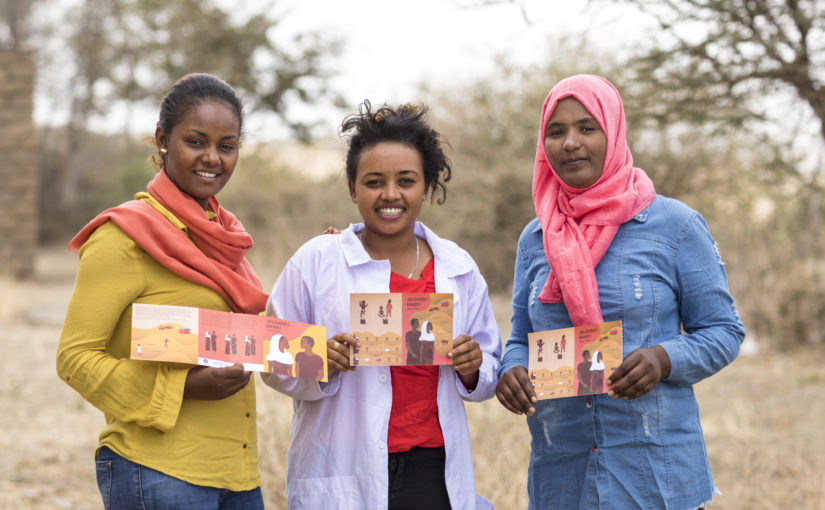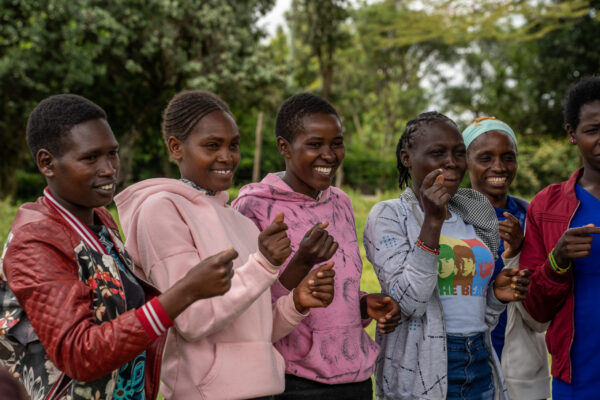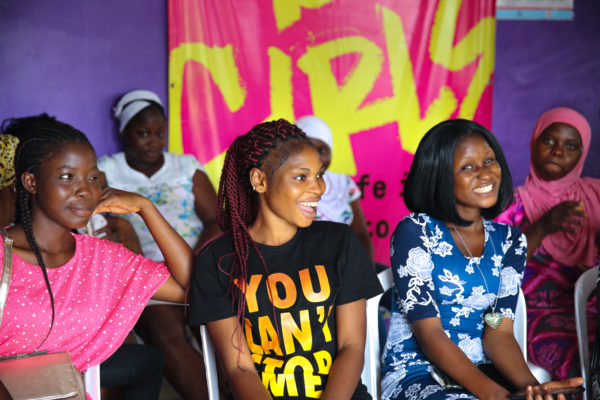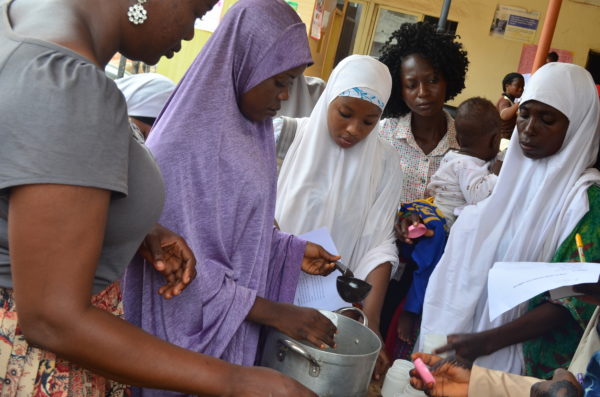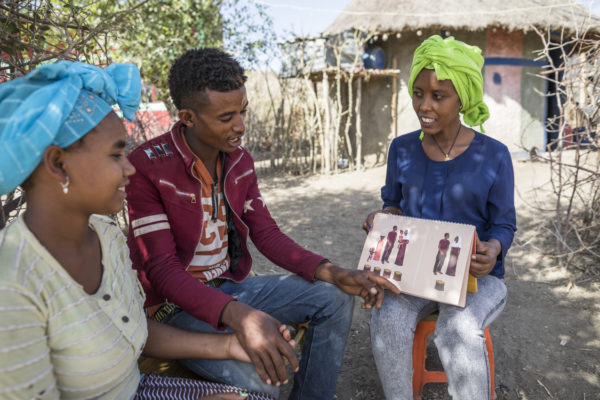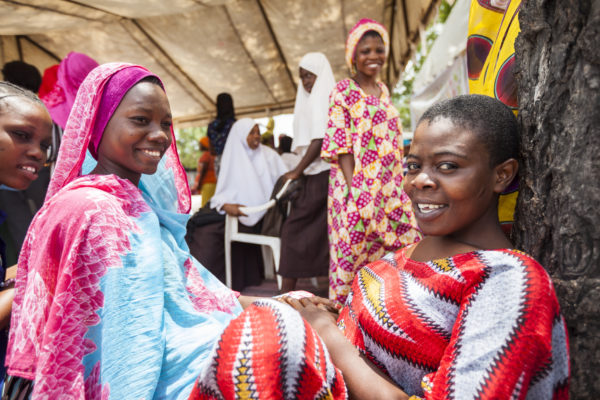Ethiopia has made significant progress in supporting gender equality and girls’ empowerment. Rates of child marriage and teenage pregnancy have decreased substantially. Access to sexual and reproductive health services has increased. There has also been progress in the education sector. School attendance rates at all levels have risen, and the gender gap in enrolment is narrowing.
Despite these positive trends, inequalities and entrenched patriarchal norms remain. Adolescent girls and young women in Ethiopia continue to face challenges, especially in rural areas. For example, the national rates of child marriage remain among the highest in Africa. Data from 2016 estimated that 58% of girls and 9% of boys were married before the age of 18. Improvements in education attainment for adolescent girls also remain sluggish. Only 15% of women have completed secondary or higher education. For men, the figure is 23%.
Ethiopia is one of the youngest and fastest growing populations in the world. Gender equality is critical for enabling young people to reach their full potential. Achieving this will require addressing gender attitudes and norms that are linked to early marriage and childbearing, and are a barrier to girls education.
The country has a national community health programme which aims to increase the availability of basic health services and promote healthy lifestyles. To do this, it uses community outreach activities, including household visits. Policymakers have been keen to understand more about its impacts on adolescent health and well-being as this could guide further efforts to improve the programme.
Our study looked at the association between this health extension programme and 12 indicators of adolescent health and well-being. The programme focuses primarily on disease prevention and health promotion. However, our findings suggest that household visits from health extension workers have had a measurable impact on multiple interconnected adolescent challenges beyond just health.
Household visits from health extension workers appear to reduce rates of child marriage, early pregnancy and school dropout. Impacts in these areas are important as they are likely to have long-term consequences. For example, delaying marriage and pregnancy promotes adolescent girls’ health and aspirations. Higher educational achievement also increases girls’ earning potential, and empowers their autonomy and decision-making.
HEALTH EXTENSION WORKERS
The health extension programme was introduced in 2003. It is delivered by local health extension workers, who are mostly young women. They are recruited from the community based on their ability to speak the local language and completion of general secondary education.
The health extension workers promote routine medical check-ups at the local health post. They also use door-to-door household visits to educate families around health issues including family planning, youth reproductive health and child marriage. The programme has become a flagship intervention.
Many families in Ethiopia still place a high value on marriage and motherhood, especially in rural communities. The legal age of marriage is 18. However, child marriage and early pregnancy remain prevalent nationwide. The government aims to eliminate child marriage by 2025. Our study indicates that the health extension programme is likely to play an important part in achieving this.
Our research suggests that household visits from health extension workers are linked to significantly lower risks of child marriage, early pregnancy and school dropout. According to our study, receiving household visits from health extension workers is associated with a 70% reduction in the probability of child marriage, 75% reduction in the probability of early pregnancy, and 63% increase in the probability of being enrolled in education. There were also measured improvements in adolescent girls’ literacy and numeracy scores.
Our findings, along with other research by UNICEF and the Overseas Development Institute, suggest these effects are likely to be produced by health extension workers talking to families about the risks of child marriage and early pregnancy and the benefits of girls education. Health extension workers can modify families’ expectations for girls to marry early, and their reluctance to invest in girls’ secondary education.
Health extension workers are also able to monitor family preparations for marriage. They can intervene in cases where the bride is younger than the legal age of 18.
The workers are not just improving adolescent health. They are transforming adolescent girls’ opportunities to pursue their own aspirations for education, employment and family.
THE NEXT STEPS
Our research highlights areas for further work, particularly around adolescent girls’ sexual and reproductive health rights. This remains a taboo issue among some communities where it’s believed that access to modern contraception will promote promiscuity. Our study found no evidence that household visits from health extension workers had addressed common misconceptions among adolescent girls around fertility and preventing sexually transmitted infections.
There are still social barriers that prevent girls from getting information, services and support, and that foster misinformation around modern contraception.
One promising initiative is Adolescents 360’s Smart Start intervention in Ethiopia. It works with young girls and the health extension program to deliver contraceptive programming.
For the last two years, Ethiopia has faced the COVID-19 pandemic, conflict in the northern part of the country, and widespread drought. All these events have disrupted the delivery of healthcare services, closed schools and heightened the needs of adolescents.
In the process, these crises may have reinforced discriminatory gender roles. So work remains for health extension workers to address cultural and attitudinal barriers that hold back adolescent girls’ education.
Dessalew Emaway, a public health practitioner, and Silinganisiwe Dzumbunu, a doctoral student with the University of Cape Town’s Centre for Social Science Research, contributed to this article and the original research it’s based on. Click here to access the original research this article is based on.![]()
This article is republished from The Conversation. Read the original article.
AUTHORS
William Rudgard, Senior Postdoc, University of Oxford
Silinganisiwe Dzumbunu, PhD Candidate , University of Cape Town

